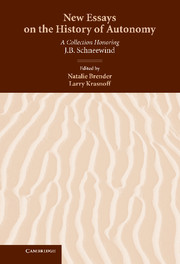Book contents
- Frontmatter
- Contents
- List of Contributors
- Acknowledgments
- Introduction
- PART ONE AUTONOMY IN CONTEXT
- 1 Justus Lipsius and the Revival of Stoicism in Late Sixteenth-Century Europe
- 2 Affective Perfectionism: Community with God without Common Measure
- 3 Autonomy and the Invention of Theodicy
- 4 Protestant Natural Law Theory: A General Interpretation
- 5 Autonomy in Modern Natural Law
- PART TWO AUTONOMY IN PRACTICE
3 - Autonomy and the Invention of Theodicy
from PART ONE - AUTONOMY IN CONTEXT
Published online by Cambridge University Press: 24 July 2009
- Frontmatter
- Contents
- List of Contributors
- Acknowledgments
- Introduction
- PART ONE AUTONOMY IN CONTEXT
- 1 Justus Lipsius and the Revival of Stoicism in Late Sixteenth-Century Europe
- 2 Affective Perfectionism: Community with God without Common Measure
- 3 Autonomy and the Invention of Theodicy
- 4 Protestant Natural Law Theory: A General Interpretation
- 5 Autonomy in Modern Natural Law
- PART TWO AUTONOMY IN PRACTICE
Summary
J. B. Schneewind has taught us that the problem of evil played a part in Immanuel Kant's “invention of autonomy.” The effort to reconcile the apparent evil in creation with the perfect nature of God led Kant to develop a new conception of divine agency – “God prescribes a law for himself” – that eventually informed a new understanding of human agency: “autonomy.” Kant's concern was not the suffering of the innocent, the paradigm case of modern theodicy, but reconciling the insights of the “voluntarist” and “antivoluntarist” (or “intellectualist”) conceptions of agency and goodness that Schneewind has shown frame the story of modern ethics. More generally, Schneewind shows that the problem of evil plays a prominent part in the history of modern ethics because it is the nemesis of religious antivoluntarism. A problem that “has confronted religious thinkers from at least the time of the Book of Job,” it becomes virulent and then lethal to theism as the human capacity and obligation to make moral judgments grows. The invention of autonomy is one of the fruits of this collision.
Historians of “theodicy” tell a subtly different story. Odo Marquard is only the most prominent to have argued that theodicy, which moderns think a central part of the job description of religion, is itself a modern phenomenon. Far from being a constant of human religious or existential experience, the philosophical problem of evil is a historical product. The problem of evil, too, had to be invented.
- Type
- Chapter
- Information
- New Essays on the History of AutonomyA Collection Honoring J. B. Schneewind, pp. 61 - 91Publisher: Cambridge University PressPrint publication year: 2004



